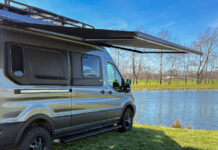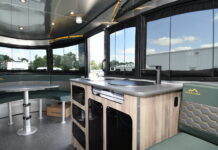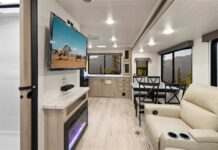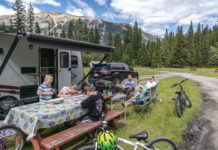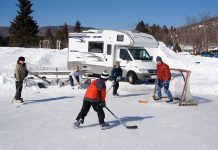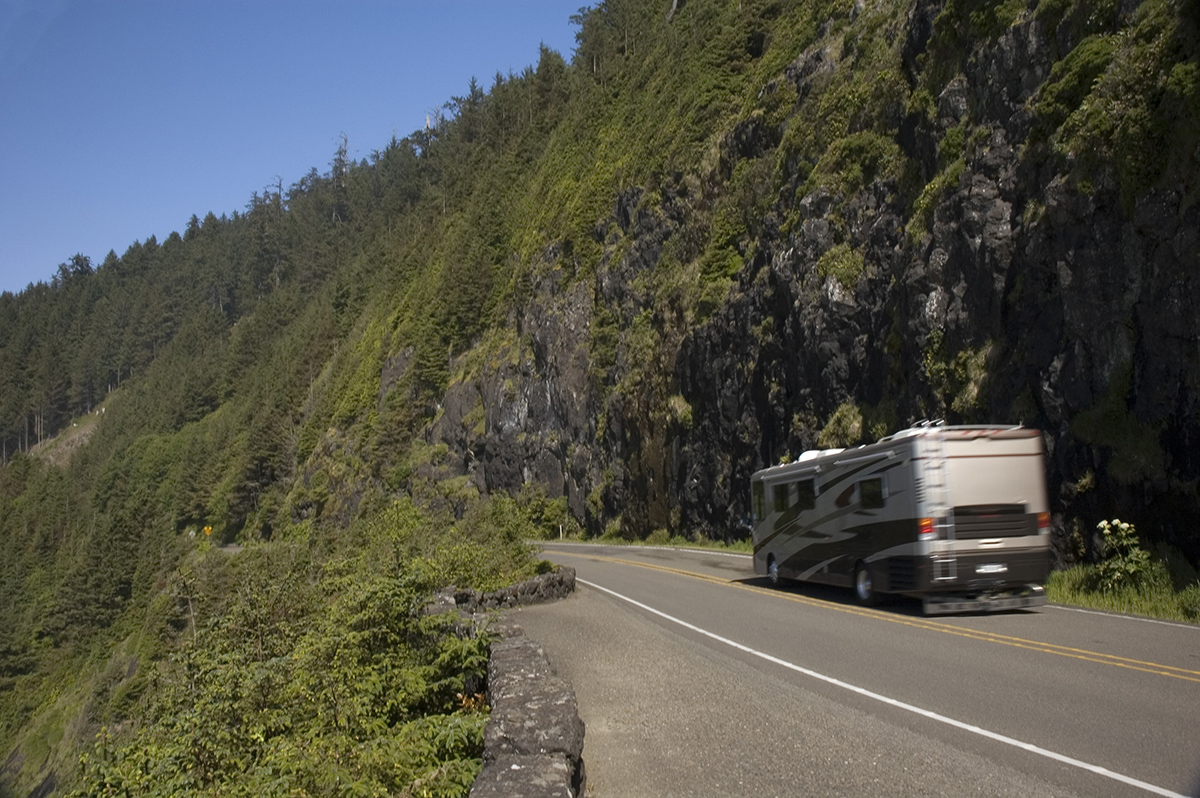Simple Tricks Keep RV Systems Running Right
By Garth W. Cane
One of the best opportunities to meet and discuss RV topics is during RV Show Season, when thousands of enthusiastic RV’ers drop by our booth to say hello. The discussion usually turns to RV maintenance, and we hear all kinds of tales, some very serious, some rather amusing, all very valuable in the never-ending quest for RV knowledge.
Sliding Out Of Shape…
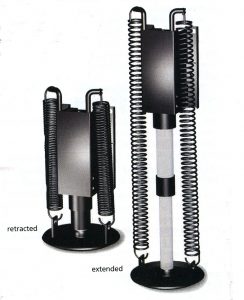 One of the problems that we often hear about involves slide-out rooms that bind or do not extend or retract easily. In most cases, this is not a major problem – simply a matter of the RV not being properly levelled. This leaves the chassis slightly twisted. The solution is very basic – before extending a slide-out, it is necessary to level the RV, and stabilize it with your jacks. To avoid damaging the slide or the slide mechanism, always retract the slide before moving the jacks to the travel position. Keep in mind that a good strong battery is required to provide enough current to operate the motors. Whenever the battery is low, there will be insufficient energy to extend or retract the slide properly. Most slide mechanisms require that the transmission be in Park and the brake applied. Never store your RV in the winter with the slides extended as the ground could shift and break the weather seal between the body and the slide.
One of the problems that we often hear about involves slide-out rooms that bind or do not extend or retract easily. In most cases, this is not a major problem – simply a matter of the RV not being properly levelled. This leaves the chassis slightly twisted. The solution is very basic – before extending a slide-out, it is necessary to level the RV, and stabilize it with your jacks. To avoid damaging the slide or the slide mechanism, always retract the slide before moving the jacks to the travel position. Keep in mind that a good strong battery is required to provide enough current to operate the motors. Whenever the battery is low, there will be insufficient energy to extend or retract the slide properly. Most slide mechanisms require that the transmission be in Park and the brake applied. Never store your RV in the winter with the slides extended as the ground could shift and break the weather seal between the body and the slide.
Power Problems
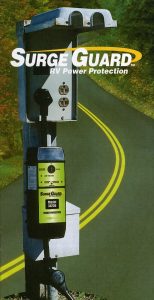 Most problems we find with the 120-volt power system occur when the voltage is low. Whenever the incoming power is lower than 105 volts, many appliances like the air conditioner, the refrigerator, furnace and TV cannot work effectively or in some cases, not at all. Some campgrounds are prone to voltage spikes as momentary glitches occur that can fry the circuit boards on TVs, microwaves, satellite receivers, refrigerators, and any other appliances that depend on electronic circuits for control. Glitches are often caused by sudden changes in current demand in the campground as other RV’s air conditioners turn on or off, and by nearby lightning strikes near the power lines. Often when generators start up, the voltage can fluctuate for the first few minutes until the generator settles down. The automatic changeover switch should be programmed to only connect the RV to the generator power after these fluctuations have stopped. Many companies manufacture surge suppressors that act in the blink of an eye to protect your electronics from destruction. Some of these connect between the RV’s power cord and the pedestal of the campground. Others are hard wired into the RV’s system to protect from any variations in voltage whether it comes from the generator or the public power lines.
Most problems we find with the 120-volt power system occur when the voltage is low. Whenever the incoming power is lower than 105 volts, many appliances like the air conditioner, the refrigerator, furnace and TV cannot work effectively or in some cases, not at all. Some campgrounds are prone to voltage spikes as momentary glitches occur that can fry the circuit boards on TVs, microwaves, satellite receivers, refrigerators, and any other appliances that depend on electronic circuits for control. Glitches are often caused by sudden changes in current demand in the campground as other RV’s air conditioners turn on or off, and by nearby lightning strikes near the power lines. Often when generators start up, the voltage can fluctuate for the first few minutes until the generator settles down. The automatic changeover switch should be programmed to only connect the RV to the generator power after these fluctuations have stopped. Many companies manufacture surge suppressors that act in the blink of an eye to protect your electronics from destruction. Some of these connect between the RV’s power cord and the pedestal of the campground. Others are hard wired into the RV’s system to protect from any variations in voltage whether it comes from the generator or the public power lines.
Water Worries
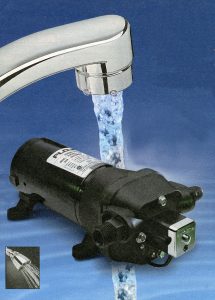 Many campgrounds have high water pressure while others have pressure that is too low. We always insert a 40-psi water regulator between the tap in the campground and the hose that carries the water to our RV. Any high pressure surge is then prevented from bursting our water hose on hot days or causing pipes inside the RV to separate. The water pump inside the RV only puts out 40psi, and the water pipes in the RV are only required to be tested to a maximum of 100psi. External showers are not compatible with any water pressure over 40psi.
Many campgrounds have high water pressure while others have pressure that is too low. We always insert a 40-psi water regulator between the tap in the campground and the hose that carries the water to our RV. Any high pressure surge is then prevented from bursting our water hose on hot days or causing pipes inside the RV to separate. The water pump inside the RV only puts out 40psi, and the water pipes in the RV are only required to be tested to a maximum of 100psi. External showers are not compatible with any water pressure over 40psi.
We have been in campgrounds were we saw water running out the door of the RV, caused by a pipe that has separated at a joint. Often we have RV’ers complain that their water pump “burps” every few minutes. This is usually caused by a small leak that allows the pressure in the system to drop until the pump starts and brings it back up. We have found many of these small leaks at the drain valve of the hot water tank. It often helps to wrap a small amount of plumbers tape around the nylon drain plug before screwing it into the tank.
Cool Running…
Your refrigerator works most efficiently when it is powered by 120-volt alternating current or with propane. The 12-volt battery power will only keep it cold if it is already cold. Battery power is most often used when traveling down the road. If you have been running on 12-volts, be sure to switch it off or over to propane when you go to lunch as the current draw is enough to discharge the battery while you are gone. The RV refrigerator works by absorption (absorbing heat from the food and expelling it to the outside air). Steel pipes are used to contain the internal pressures created when a combination of ammonia, water, and hydrogen are heated. If the refrigerator is off level when parked for a period of time, the normal gravitational flow stops, and any fluid near the burner tends to overheat. The sodium chromate rust inhibitor used inside the steel pipes can crystallize, causing blockages in the very narrow pump tube. This blockage builds up gradually like plaque in an artery, so it will slowly cause less fluid to be pumped around the system, degrading the performance of the refrigerator. When this tube gets blocked, the refrigerator will need to have its cooling unit replaced.
If you are going to be parked off level while you are shopping or having a meal in a restaurant, turn the refrigerator OFF. The refrigerator is very well insulated, so as long as the door is kept closed, it will only lose one degree of cold per hour.
If the RV is moving, there is sometimes enough vibration to prevent the circulation of refrigerant from stopping – even when going up or down steep hills. The refrigerator depends on a free flow of air over the coils in the back to allow the heat that is removed from the food to be expelled through the roof vent.
The inspection panel on the outside of the RV is not a place to store things. It must be kept clear. In hot temperatures, park the RV so that the sun is not beaming down on the back of the refrigerator. When leaving for a trip, cool the refrigerator down for a day before you load it with food taken from your house refrigerator, and then when purchasing new groceries on the road, buy your food from the refrigerated food sections of the store. Do not forget to turn off the propane supply to the refrigerator when traveling through long tunnels (like the 18 mile Chesapeake Bay tunnel) or aboard ships.
Cold Showers Again?
Many RV’ers have difficulties with their hot water heater. If it does not light, it may be a problem with low voltage not allowing the gas valve to open. The control circuits are designed to shut off the gas if the voltage is low or there is no flame. Often we see water dripping from the pressure relief valve at the top of the heater. As your RV goes down the road, the vibration can cause the air space at the top of the heater to be absorbed into the hot water. When the pressure builds up from the expansion of the water as it is heated, the water has nowhere to go except out the relief valve. If the relief valve is dripping, it is doing its job of protecting the tank. When this happens, turn off the incoming water and the water pump, open the relief valve and drain about two quarts of water from the tank. As the water comes out, air will be drawn into the tank to restore the necessary air space needed for expansion. Now replace the drain plug and close the relief valve.
Some people who leave the water sit in their hot water tank for extended periods of time when the RV is not being used complain of a rotten egg smell from their hot water taps. The water and aluminum of the tank chemically react and develop aluminum sulphide over time. This is the smell. One procedure is to flush the tank several times with clean water. Another is to use a treatment to neutralize this smell. A material called Purge Tank Cleaner is available from a company called Capt. Phab and can be mixed up and pumped into the tank. When left overnight or 24 hours, the aluminum sulphide is converted to aluminum sulphate that is harmless and has no smell. It is available from many RV dealers across the country.
Fire up the Furnace!
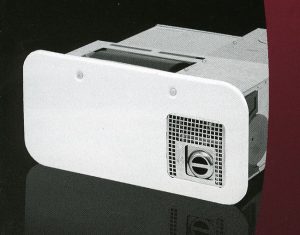 The furnace in your RV is designed to only work when the battery voltage is above 10.5 volts dc. Unless the voltage is above this level, the fan motor will not spin fast enough to bring in sufficient air for correct combustion, and the control system will not let the gas valves open. Often the hot air vents on the floor of the RV are restricted by throw rugs that prevent the furnace from delivering the required amount of air that is needed to move the heated air away from the furnace. When this happens, the furnace overheats and a protective thermostat will shut down the flame until the furnace cools off. When either of these events happen, the furnace will only blow cold air.
The furnace in your RV is designed to only work when the battery voltage is above 10.5 volts dc. Unless the voltage is above this level, the fan motor will not spin fast enough to bring in sufficient air for correct combustion, and the control system will not let the gas valves open. Often the hot air vents on the floor of the RV are restricted by throw rugs that prevent the furnace from delivering the required amount of air that is needed to move the heated air away from the furnace. When this happens, the furnace overheats and a protective thermostat will shut down the flame until the furnace cools off. When either of these events happen, the furnace will only blow cold air.
Electrifying Situations!
The 12-volt battery system is the heart of the modern RV. Without a fully charged battery, many of the systems will not work properly or at all. When you are traveling in your RV, the engine alternator produces current that keeps the battery charged up. When you are parked in a campground, the converter changes the incoming 120-volts of alternating current to 12-volts of direct current to keep the battery up, while allowing you to use the lights, furnace, refrigerator and other appliances.
If the voltage in the campground is low, there is not enough voltage to charge the battery properly. A good battery will maintain its charge for quite a while if no current is being drawn away, but there are several items that still draw current from the battery even when we think that everything is shut down. Clocks, radios, and refrigerators all draw a very small phantom current even when turned off. When parked for a longer period of time, or when the RV is not in use, it is important to charge the batteries about one day for every month of storage to prevent the batteries from going dead, the liquid electrolyte in the cells from evaporating, and the chemicals on the plates from hardening (sulfating).
Batteries in RVs are prone to dying in storage and may have to be replaced every year if not kept properly charged. The deep-cycle RV batteries are expected to operate for six months of intermittent use, and then sit idle for another six months. The batteries in our cars are used for about 30 seconds to start the engine and then are recharged as we drive every day. RV’ers who stay for six months time in a southern campground often find that their batteries have been overcharged. While the RV’s are plugged in every day, all the current required to operate everything is coming from the converter, so as the batteries are being charged the electrolyte boils away. It is important in these cases to check the level of the electrolyte once a month to be sure the plates are still covered.
Cool, Man!
Roof air conditioners must have a good voltage supply or the compressor is not allowed to run. Air conditioners require a minimum of 20 amperes of current to start. If the voltage is low, you will hear the motors inside growling as they try to draw enough current to start. This often causes a momentary high current that will blow the circuit breaker. The fan will move air at low voltages, but the circuit boards will not energize the cooling unit. Often in campgrounds, the incoming voltage may shut down for a few moments for many reasons. If the air conditioner has been running, there will be high pressure in the compressor lines. When the power comes back on, the compressor has to start up against all this pressure and it could stall. It is like trying to push a car up a hill to start it. If this happens to you, turn off the air conditioner and the pressures inside will equalize in a few minutes, allowing it to start up freely.
Most of the time, RV systems that don’t perform as expected are simply reacting to your lack of attention. Take a few minutes to check out your appliances and systems, and your RV will provide all the comforts and conveniences of home.






